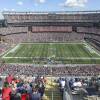The 2026 men's World Cup is three years away, but Patriots owner Robert Kraft is already in a full-on soccer fever.
“I go back to [the 1994 men’s World Cup] and the world we’re living in now, we need the World Cup more than ever,” said Kraft, who was the honorary chairman of the World Cup United bid between the United States, Mexico and Canada.
Kraft will get a chance to see the impact the World Cup will have on the world when Gillette Stadium hosts games in 2026. And on Thursday, for the first time, Boston unveiled its official branding for the 2026 World Cup as it continues to prepare to take part in one of the world’s biggest sporting events.
Local and state officials were on hand at Big Night Live on Causeway Street for the unveil party. Speaking at the event, Boston Mayor Michelle Wu pointed to the city's international spirit.
"So it only makes sense that for the fourth time, the world's game will return to the city of the world,” she said. “We've opened our doors to our neighbors across the globe for more than 400 years here in Boston. And we can't wait to do it again in 2026 for fan fests, celebrations and viewings throughout our neighborhoods. We can't wait to welcome you to our incredible city."

There’s no word yet on how many games Gillette Stadium will host; the schedule for 2026 is expected to be released later this year. Boston will know which teams will play at Gillette at the final draw, which is set to take place a few months before the Cup.
Regardless who ends up playing here, the impact the World Cup will have on the area is expected to be massive. Organizers say an economic impact of up to $500 million could be coming Boston’s way from the games at Gillette Stadium.
Brian Bilello, president of the New England Revolution, said that each host city will get six and a half matches on average — but he’s hoping for more. He pointed out that the Boston area has several communities that would come out to support the countries that could end up playing at Gillette.
"For me, the U.S. would be great. I mean, to have the home team here, there's nothing like it," Bilello said. "We have a great Brazilian population, we've had some amazing events with Brazil at our stadium in the past. My family's all Italian, so for me, I would love to see Italy. But we have a vibrant Colombian community, we have a vibrant Haitian community if Haiti qualifies. ... You name the country, and we have a great community to support it here in Boston."








